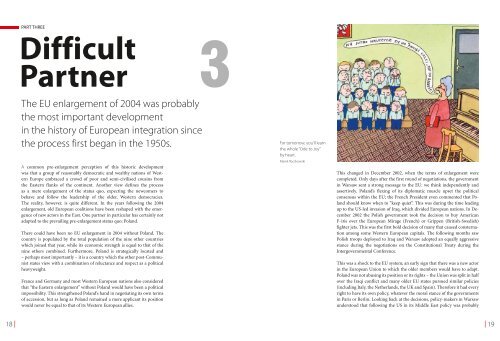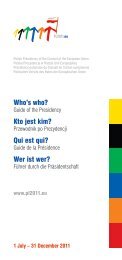„The Brighter Side of Europe” / Piotr Kaczyński
„The Brighter Side of Europe” / Piotr Kaczyński
„The Brighter Side of Europe” / Piotr Kaczyński
You also want an ePaper? Increase the reach of your titles
YUMPU automatically turns print PDFs into web optimized ePapers that Google loves.
PART THREE<br />
Difficult<br />
Partner<br />
The EU enlargement <strong>of</strong> 2004 was probably<br />
the most important development<br />
in the history <strong>of</strong> European integration since<br />
the process first began in the 1950s.<br />
A common pre-enlargement perception <strong>of</strong> this historic development<br />
was that a group <strong>of</strong> reasonably democratic and wealthy nations <strong>of</strong> Western<br />
Europe embraced a crowd <strong>of</strong> poor and semi-civilised cousins from<br />
the Eastern flanks <strong>of</strong> the continent. Another view defines the process<br />
as a mere enlargement <strong>of</strong> the status quo, expecting the newcomers to<br />
behave and follow the leadership <strong>of</strong> the older, Western democracies.<br />
The reality, however, is quite different. In the years following the 2004<br />
enlargement, old European coalitions have been reshaped with the emer-<br />
gence <strong>of</strong> new actors in the East. One partner in particular has certainly not<br />
adapted to the prevailing pre-enlargement status quo: Poland.<br />
There could have been no EU enlargement in 2004 without Poland. The<br />
country is populated by the total population <strong>of</strong> the nine other countries<br />
which joined that year, while its economic strength is equal to that <strong>of</strong> the<br />
nine others combined. Furthermore, Poland is strategically located and<br />
– perhaps most importantly – it is a country which the other post-Communist<br />
states view with a combination <strong>of</strong> reluctance and respect as a political<br />
heavyweight.<br />
France and Germany and most Western European nations also considered<br />
that “the Eastern enlargement” without Poland would have been a political<br />
impossibility. This strengthened Poland’s hand in negotiating its own terms<br />
<strong>of</strong> accession, but as long as Poland remained a mere applicant its position<br />
would never be equal to that <strong>of</strong> its Western European allies.<br />
3<br />
For tomorrow, you’ll learn<br />
the whole “Ode to Joy”<br />
by heart.<br />
Marek Raczkowski<br />
This changed in December 2002, when the terms <strong>of</strong> enlargement were<br />
completed. Only days after the first round <strong>of</strong> negotiations, the government<br />
in Warsaw sent a strong message to the EU: we think independently and<br />
assertively. Poland’s flexing <strong>of</strong> its diplomatic muscle upset the political<br />
consensus within the EU; the French President even commented that Poland<br />
should know when to “keep quiet”. This was during the time leading<br />
up to the US-led invasion <strong>of</strong> Iraq, which divided European nations. In December<br />
2002 the Polish government took the decision to buy American<br />
F-16s over the European Mirage (French) or Grippen (British-Swedish)<br />
fighter jets. This was the first bold decision <strong>of</strong> many that caused consternation<br />
among some Western European capitals. The following months saw<br />
Polish troops deployed to Iraq and Warsaw adopted an equally aggressive<br />
stance during the negotiations on the Constitutional Treaty during the<br />
Intergovernmental Conference.<br />
This was a shock to the EU system; an early sign that there was a new actor<br />
in the European Union to which the older members would have to adapt.<br />
Poland was not abusing its position or its rights – the Union was split in half<br />
over the Iraqi conflict and many older EU states pursued similar policies<br />
(including Italy, the Netherlands, the UK and Spain). Therefore it had every<br />
right to have its own policy, whatever the moral stance <strong>of</strong> the governments<br />
in Paris or Berlin. Looking back at the decisions, policy-makers in Warsaw<br />
understood that following the US in its Middle East policy was probably<br />
18 | | 19



